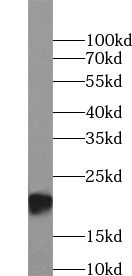Products
TNF alpha antibody
Category:
Research Area:
| Synonyms: | Cachectin antibody, DIF antibody, TNF antibody, TNF a antibody, TNF alpha antibody, TNFA antibody, TNF-a antibody, TNFSF2 antibody, Tumor necrosis factor antibody | ||
| Catalogue No.: | FNab08815 | Reactivity: | Human, Mouse, Rat |
| Host: | Mouse | Tested Application: | ELISA, WB, IHC |
| Clonality: | monoclonal | Isotype: | IgG2b |
- SPECIFICATIONS
- Product Name
- TNF alpha antibody
- Catalogue No.
- FNab08815
- Size
- 100μg
- Form
- liquid
- Purification
- Protein A+G purification
- Purity
- ≥95% as determined by SDS-PAGE
- Clonality
- monoclonal
- Isotype
- IgG2b
- Clone ID
- 2A9
- Storage
- PBS with 0.02% sodium azide and 50% glycerol pH 7.3, -20℃ for 12 months(Avoid repeated freeze / thaw cycles.)
Immunogen
- Immunogen
- tumor necrosis factor(TNF superfamily, member 2)
- Alternative Names
- Cachectin antibody, DIF antibody, TNF antibody, TNF a antibody, TNF alpha antibody, TNFA antibody, TNF-a antibody, TNFSF2 antibody, Tumor necrosis factor antibody
- UniProt ID
- P01375
- Observed MW
- 22 kDa
Application
- Tested Applications
- ELISA, WB, IHC
- Recommended dilution
- WB: 1:500-1:5000; IHC: 1:200-1:1000
Validated Images
 LPS treated RAW 264.7 cells were subjected to SDS PAGE followed by western blot with FNab08815(TNF-a Antibody) at dilution of 1:1000
LPS treated RAW 264.7 cells were subjected to SDS PAGE followed by western blot with FNab08815(TNF-a Antibody) at dilution of 1:1000
 Immunohistochemistry of paraffin-embedded human breast cancer tissue slide using FNab08815(TNF-a Antibody) at dilution of 1:800. heat mediated antigen retrieved with Tris-EDTA buffer(pH9).
Immunohistochemistry of paraffin-embedded human breast cancer tissue slide using FNab08815(TNF-a Antibody) at dilution of 1:800. heat mediated antigen retrieved with Tris-EDTA buffer(pH9).
- Background
- TNF, as also known as TNF-alpha, or cachectin, is a multifunctional proinflammatory cytokine that belongs to the tumor necrosis factor(TNF) superfamily. It is expressed as a 26 kDa membrane bound protein and is then cleaved by TNF-alpha converting enzyme(TACE) to release the soluble 17 kDa monomer, which forms homotrimers in circulation. It is produced chiefly by activated macrophages, although it can be produced by many other cell types such as CD4+ lymphocytes, NK cells, neutrophils, mast cells, eosinophils, and neurons. It can bind to, and thus functions through its receptors TNFRSF1A/TNFR1 and TNFRSF1B/TNFBR. This cytokine is involved in the regulation of a wide spectrum of biological processes including cell proliferation, differentiation, apoptosis, lipid metabolism, and coagulation. This cytokine has been implicated in a variety of diseases, including autoimmune diseases, insulin resistance, and cancer.



